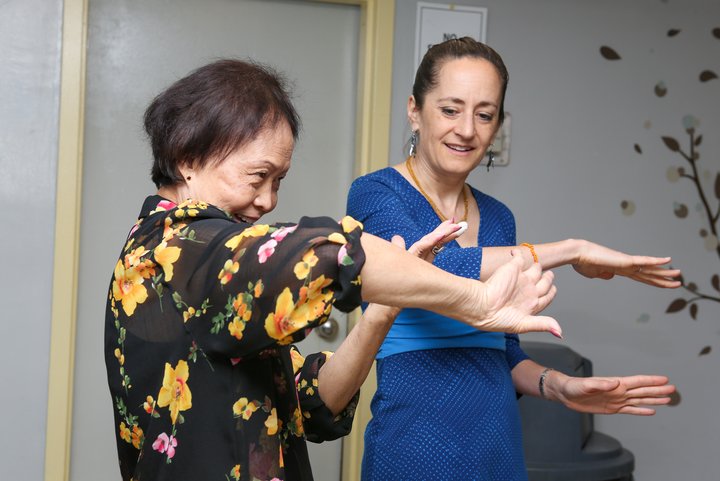
“You thought we were good now; the final product is going to be amazing!”
– SU-CASA participant
The people who participate in creative aging programs report numerous benefits beyond those of senior center attendance alone.
Evidence
- Participants in SU-CASA focus groups spoke of being rejuvenated and of reinventing themselves, sometimes after periods of sickness or struggle.
- SU-CASA participants wanted to avoid isolation at home after retirement. One woman said, “Las paredes embrutecen” (The walls dull your senses). The art projects created a community — in one program, participants wrote a song together about their lives — and the friendships they made in the classes extended beyond the senior center. One woman picked up her friend at 8 a.m. on class days to be sure they’d be in class by 9:30. Members of another group went to jazz clubs together.
- The SU-CASA focus groups mirrored other qualitative research on creative aging programs. For example, a participant in an art class for older adults in San Antonio said, “Making art, it is like taking a vitamin for your entire body, it is very good” (Cantu & Fleuriet, 2018).
“Las paredes embrutecen.” (The walls dull your senses.)
There is some quantitative research that supports participants’ perceptions.
- A series of well-designed studies found that at the end of a tailored theater program, older adult participants had higher scores than a control group on personal growth, problem solving, verbal fluency, and three out of four memory tests (Noice, Noice, & Staines, 2004; Noice & Noice, 2009; Noice & Noice, 2013).
- Brain imaging shows that the learning component of music or visual art training can boost brain plasticity and lead to changes in older adults’ brain function, potentially improving essential cognitive skills such as processing speed (Alain et al., 2019).
- In a Dutch study of 35 older adults, those randomly assigned to a six-month weekly dance course performed better than control group members in several cognitive domains (including memory, attention, and nonverbal learning) and on two physical measures (hand-motor skills and posture) (Kattenstroth et al., 2013).
- In a random assignment study of 390 older adults in senior centers in the San Francisco area, participants in a 44-week choir program experienced a reduction in loneliness and increased interest in life after six months (Johnson et al., 2018).
- In a large random assignment study in England, a three-month community singing program resulted in improved mental health and reduced levels of depression and anxiety (Coulton et al., 2015).
3. Older Adults at All Senior-Serving Organizations Deserve SU-CASA at its Best